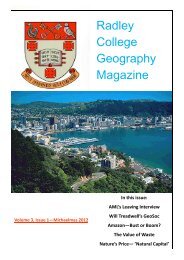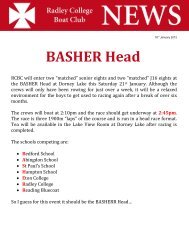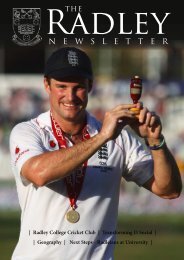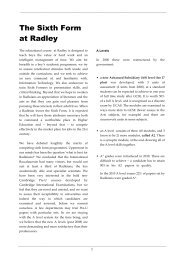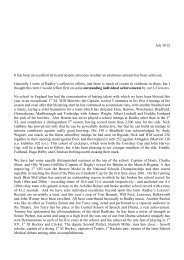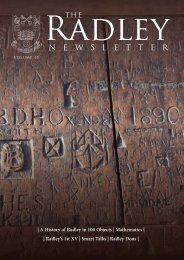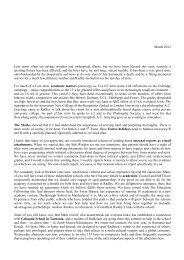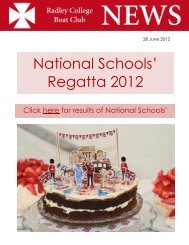INDEPENDENT SCHOOLS INSPECTORATE - Radley College
INDEPENDENT SCHOOLS INSPECTORATE - Radley College
INDEPENDENT SCHOOLS INSPECTORATE - Radley College
You also want an ePaper? Increase the reach of your titles
YUMPU automatically turns print PDFs into web optimized ePapers that Google loves.
<strong>INDEPENDENT</strong> <strong>SCHOOLS</strong> <strong>INSPECTORATE</strong><br />
INSPECTION REPORT ON<br />
<strong>Radley</strong> <strong>College</strong><br />
Full Name of the School <strong>Radley</strong> <strong>College</strong><br />
DCSF Number 931/6079<br />
Registered Charity Number 309243<br />
Address<br />
Abingdon, Oxfordshire OX14 2HR.<br />
Telephone Number 01235 543000<br />
Fax Number 01235 543106<br />
Email Address<br />
warden@radley.org.uk<br />
Warden<br />
Mr Angus McPhail<br />
Chairman of Council Lord Wilson of Dinton<br />
Age Range 13 to 18<br />
Gender<br />
Boys<br />
Inspection Dates 18 th to 21 st February 2008<br />
This inspection report follows the framework laid down by the Independent Schools Inspectorate<br />
(ISI). The inspection was carried out under the arrangements of the Independent Schools Council<br />
(ISC) Associations for the maintenance and improvement of the quality of their membership. It was<br />
also carried out under Section 162A(1)(b) of the Education Act 2002 as amended by the Education<br />
Act 2005, under the provisions of which the Secretary of State for Education and Skills accredited<br />
ISI as the body approved for the purpose of inspecting schools belonging to ISC Associations and<br />
reporting on compliance with the Education (Independent School Standards) (England) Regulations<br />
2003 as amended with effect from January 2005 and May 2007.<br />
The inspection was not carried out in conjunction with Ofsted, Children’s Directorate, and the report<br />
does not contain specific judgements on the National Minimum Boarding Standards. It comments on<br />
the progress made by the school in meeting the recommendations set out in the most recent statutory<br />
boarding inspection and evaluates the quality of the boarding experience and its contribution to<br />
pupils’ education and development in general. The full Ofsted report can be found at<br />
www.ofsted.gov.uk under Inspection reports/Boarding schools.<br />
The inspection does not examine the financial viability of the school or investigate its accounting<br />
procedures. The inspectors check the school’s health and safety procedures and comment on any<br />
significant hazards they encounter: they do not carry out an exhaustive health and safety<br />
examination. Their inspection of the premises is from an educational perspective and does not<br />
include in-depth examination of the structural condition of the school, its services or other physical<br />
features.<br />
© Independent Schools Inspectorate 2008
CONTENTS<br />
1. INTRODUCTION ..........................................................................................1<br />
Characteristics of the School ................................................................................................ 1<br />
2. THE QUALITY OF EDUCATION ...............................................................3<br />
The Educational Experience Provided ................................................................................. 3<br />
Pupils’ Learning and Achievements..................................................................................... 5<br />
Spiritual, Moral, Social and Cultural Development of Pupils.............................................. 6<br />
The Quality of Teaching (Including Assessment)................................................................ 8<br />
3. THE QUALITY OF CARE AND RELATIONSHIPS ................................10<br />
The Quality of Pastoral Care, and the Welfare, Health and Safety of Pupils..................... 10<br />
The Quality of Links with Parents and the Community..................................................... 11<br />
The Quality of Boarding Education ................................................................................... 13<br />
4. THE EFFECTIVENESS OF GOVERNANCE AND MANAGEMENT ....15<br />
The Quality of Governance ................................................................................................ 15<br />
The Quality of Leadership and Management ..................................................................... 16<br />
5. CONCLUSIONS AND NEXT STEPS.........................................................18<br />
Overall Conclusions ........................................................................................................... 18<br />
Next Steps........................................................................................................................... 18<br />
6. SUMMARY OF INSPECTION EVIDENCE ..............................................19<br />
List of Inspectors ................................................................................................................ 19
<strong>Radley</strong> <strong>College</strong> 1<br />
1. INTRODUCTION<br />
Characteristics of the School<br />
1.1 St Peter’s <strong>College</strong>, <strong>Radley</strong> was founded in 1847 by the Reverend William Sewell, Fellow of<br />
Exeter <strong>College</strong>, Oxford. <strong>Radley</strong> <strong>College</strong> – the name by which it is known – was incorporated<br />
by royal charter and is an all boarding, all boys school in the village of <strong>Radley</strong>, near Oxford.<br />
At the time of the inspection, the college had 644 pupils aged from 13 to 18, with 397 aged<br />
13 to 16 and 247 in the sixth form. Just over a fifth of pupils are in receipt of bursary or<br />
scholarship funding, almost all of which is from the college’s own resources. The college<br />
has eight boarding houses. Pupils come from different regions of the United Kingdom and<br />
some pupils’ families are based overseas. Pupils are from a wide range of family<br />
backgrounds, but mainly from the professions or business.<br />
1.2 <strong>Radley</strong> <strong>College</strong> was founded to provide an independent boarding school education on the<br />
principles of the Church of England. William Sewell intended the college to be different, to<br />
have a concern with “the aesthetic, good manners and kindness” and that philosophy still<br />
underpins the aims of the college.<br />
1.3 Since the last inspection, in May 2002, the college has built a theatre, a new pavilion and<br />
new kitchens. It is currently completing the building of two new boarding houses. It has<br />
developed its music and drama provision in a number of ways, including the foundation of a<br />
choristership scheme for local primary children. The college has reorganised its senior<br />
management team (SMT) and developed a pastoral committee to give greater oversight of<br />
pastoral care and pupil welfare. A foundation fund has been built up to support scholarships<br />
and building development.<br />
1.4 The main entry age for the college is thirteen. All prospective pupils sit the Common<br />
Entrance examinations or the <strong>Radley</strong> scholarship examination and a report is required from<br />
the feeder school of each applicant. The warden (headmaster) of the college reserves the<br />
right to interview any candidate for admission.<br />
1.5 Standardised tests in recent years indicate that the average ability of the pupils on entering<br />
the school at the age of thirteen is well above the national average. If pupils are performing<br />
in line with their abilities, their results in public examinations should be well above the<br />
average for all maintained schools but below the average for maintained selective schools.<br />
1.6 No pupil has a statement of special educational needs, but the college has identified 130<br />
pupils in need of learning support for learning difficulties or disabilities (LDD) which<br />
include dyslexia, dyspraxia and problems of retention and planning. All pupils are proficient<br />
in English. Most pupils are from preparatory schools or maintained senior schools. The<br />
overwhelming majority of pupils in Year 11 stay for the sixth form. On leaving Year 13, all<br />
proceed to university or higher education.<br />
1.7 The college’s expectation is that boys from a broad ability range will discover, and fulfil,<br />
their talents and will achieve outstanding academic results. The college aims to develop<br />
pupils’ character through a strong pastoral network, based on the boarding houses and on the<br />
daily influence of chapel. The college believes in the positive influences on pupils’<br />
development of the close-knit school community. It also aims to develop in its pupils the<br />
qualities of self-confidence, ease of personal communication, a firm grasp of what is right<br />
and wrong and an awareness of responsibility and concern for others.
<strong>Radley</strong> <strong>College</strong> 2<br />
1.8 In this report the following specific <strong>Radley</strong> terminology is used: the headmaster is known as<br />
the warden, teachers are known as dons, housemasters are known as tutors and houses are<br />
known as socials.<br />
1.9 National Curriculum nomenclature is used throughout this report to refer to year groups in<br />
the college. The year group nomenclature used by the college and its National Curriculum<br />
(NC) equivalence are shown in the following table.<br />
School<br />
NC name<br />
Shell Year 9<br />
Remove Year 10<br />
Fifth Year 11<br />
VI.1 Year 12<br />
VI.2 Year 13
<strong>Radley</strong> <strong>College</strong> 3<br />
2. THE QUALITY OF EDUCATION<br />
The Educational Experience Provided<br />
2.1 <strong>Radley</strong> provides an outstanding range of educational opportunities which is well suited to the<br />
interests, aptitudes and needs of all its pupils. The education provided fulfils very<br />
successfully the college’s declared aims and philosophy that “boys from a broad ability range<br />
will discover and fulfil their talents and will achieve outstanding academic results”. The<br />
college’s aim that boys will “gain confidence from experiencing success” is achieved through<br />
the effective implementation of the academic curriculum, which leads boys to high<br />
achievement, and through the very wide range of high quality extra-curricular opportunities.<br />
These are pursued with enthusiasm and reach an excellent level of performance.<br />
2.2 The college encourages dons “relentlessly to drive Radleians to aim high” and this is indeed<br />
the case. <strong>Radley</strong> aims to develop the character of its pupils and their ‘self-confidence, ease<br />
of personal communication, awareness of responsibility and concern for others’. The dons<br />
and other members of staff work extremely hard to achieve all of these aims and are very<br />
successful in so doing.<br />
2.3 The education as a whole gives pupils experience in, and contributes effectively to,<br />
linguistic, mathematical, scientific, technological, human and social, physical, and aesthetic<br />
and creative development, and makes provision for acquisition of skills of speaking,<br />
listening, literacy and numeracy. Year 9 pupils experience a very wide and appropriate range<br />
of subjects. As boys move to GCSE in Years 10 and 11, the combination of core and<br />
optional subjects allows for and encourages the development of particular enthusiasms and<br />
aptitudes. Provision in the sixth form is strong, with a good range of subjects on offer,<br />
complemented by academic societies and activities.<br />
2.4 The use of the International GCSE and the early sitting of GCSE and A/S examinations in<br />
some subjects allow the most able boys to be stretched appropriately. Setting by ability,<br />
including in most sixth form classes, ensures that boys move at a pace appropriate to them,<br />
though expectations of all are high. The time allocated across the curriculum is well<br />
balanced.<br />
2.5 A distinctive feature of <strong>Radley</strong>’s sixth form provision is the commitment to a ‘linear’<br />
approach to courses, whereby, unless a boy is not continuing a subject to A2 level, both A2<br />
and A/S level examinations are usually taken at the end of Year 13. The college believes that<br />
this allows boys to develop greater maturity before taking public examinations. This policy<br />
of a non-examined Year 12 allows more teaching time than would otherwise be the case and<br />
gives more time for expeditions and tours. <strong>Radley</strong> also eschews the study leave option and<br />
teaching continues during the examination period. Outstanding results confirm the success<br />
of this policy.<br />
2.6 Pupils’ experience of personal, social and health education (PSHE) reflects the college’s<br />
aims and ethos and the education is enriched by extra-curricular activities, links with the<br />
community, and provision for voluntary service and work experience. A wide range of<br />
extra-curricular activities is available, catering for and developing a diverse range of<br />
interests. Boys are justifiably very appreciative of the fact that everyone can, to quote one<br />
boy, “find his niche, or niches”. Activities observed during the inspection ranged from an<br />
animated sixth form cooking activity in French to a lively Year 9 taster drama session.<br />
Music and drama are pursued to a very high standard, with committed and expert staff<br />
encouraging boys’ efforts and the development of their skills very effectively. The<br />
atmosphere of creativity and of cultural activity is strong, an example being the music in<br />
chapel.
<strong>Radley</strong> <strong>College</strong> 4<br />
2.7 The Combined Cadet Force (CCF) is a compulsory element of the educational experience for<br />
Year 10 boys. They have the option of continuing with it in later years, taking advantage of<br />
the leadership opportunities provided. The CCF provides a wide range of activities including<br />
adventurous training expeditions; such challenges coerce boys into experience and take them<br />
outside the comfortable world of the campus. Since 2002, the work of the CCF has been<br />
monitored as part of the Wednesday activity programme. The Duke of Edinburgh’s Award<br />
(DoE) provides similar opportunities for expeditions. The notable increase in interest in this<br />
voluntary activity since the last inspection reflects its popularity. Opportunities for<br />
community service exist in DoE and more widely in the community action scheme.<br />
2.8 Pupils enjoy a considerable range of sporting opportunities. In the course of the inspection,<br />
many diverse sports were observed including golf, countryside sports, water polo, rackets<br />
and rowing. Sports are pursued with enthusiasm and coached to an extremely high standard<br />
at all levels. Notable is the fact that a very high percentage of college pupils represents<br />
<strong>Radley</strong> in sport and, testament to the quality of coaching, is the number of former pupils who<br />
perform at national level.<br />
2.9 Very good attention is given to preparing pupils for the next stage of education and for adult<br />
life. Preparation for higher education is strong, exemplified by the quality of the college’s<br />
Higher Education Guide. A well-attended lecture on entry to American universities<br />
demonstrated the commitment to widening the range of university choices. Preparation for<br />
Oxford and Cambridge application is well planned and supportive of boys’ own work.<br />
Career needs are well identified and addressed by careers advisors, form masters, tutors and<br />
dons. Good opportunities for work experience also extend the horizons of boys. Boys’ work<br />
experience planning is well monitored.<br />
2.10 Learning support for pupils through the designated learning support team and by dons is<br />
excellent. “The dons work miracles” was an unprompted observation by an older boy who<br />
had entered the college with considerable literacy difficulties but eventually gained a GCSE<br />
grade A in English. Indeed many boys who had previously experienced problems go on to<br />
achieve highly in a wide range of A levels. The work of the learning support department is<br />
well integrated with the academic departments and the information and communication<br />
technology (ICT) systems support this provision very well. Provision for gifted and talented<br />
pupils is good: the top sets have swift academic pace, and extension material, ‘one to one’<br />
and small group support are readily available.<br />
2.11 The college meets the regulatory requirements for the curriculum [Standard 1].
<strong>Radley</strong> <strong>College</strong> 5<br />
Pupils’ Learning and Achievements<br />
2.12 Pupils’ learning and achievements are excellent. Pupils gain wide knowledge, skills and<br />
understanding of the many subjects and activities provided. In the course of their education,<br />
they are able to develop these effectively to provide the essential skills and attitudes for work<br />
and study at high levels. The college’s aim that boys will leave having learnt what it is to<br />
work hard and also how to learn is clearly met, and academic achievement has further<br />
improved since the last inspection.<br />
2.13 Pupils show a high degree of critical and creative thinking. The depth of discussion in many<br />
lessons, the abundance of high quality artwork and design technology (DT) on display<br />
around the campus, and the first class musical and drama performances are all testament to<br />
this.<br />
2.14 Pupils’ numeracy skills are well developed and they apply mathematics and mathematical<br />
concepts very well. This was observed, not only in mathematics lessons but also, for<br />
example, in geography coursework in Year 11 involving a high standard of graph work and<br />
statistical analysis.<br />
2.15 Likewise, boys have significant literacy skills, seen in the well-constructed and articulate<br />
prose produced across the age range. Boys express themselves confidently both in the<br />
written and spoken word. The latter skill was a hallmark of lessons observed, such as the<br />
Year 13 history lesson where pupils were discussing the military and political issues which<br />
lay behind the actions of British politicians in the 1930s, when faced with the rise of the<br />
Third Reich.<br />
2.16 ICT is an integral part of life at <strong>Radley</strong> and boys use it widely. They use it to access learning<br />
materials, to send work to dons and to enhance the presentation of their projects and<br />
coursework. Computer aided design is introduced in Year 9 DT and the boys are keen to<br />
exploit the possibilities it offers them. One Year 10 pupil was proud to show his birdhouse<br />
design developed using specialist software. Boys design and give digital presentations in<br />
class, as in a Year 11 geography lesson on global energy issues.<br />
2.17 No differences in relative attainment between different groups of pupils were observed and<br />
all subjects achieve excellent results. Indeed, boys who attained relatively low scores on<br />
entrance to the college went on to achieve grades in the highest band at A level in the<br />
Summer of 2007.<br />
2.18 Results reflect consistent progress at GCSE and A level. Pupils’ attainment in GCSE and at<br />
A level is high in relation to their abilities. During the last three years for which national<br />
comparative data was available at the time of the inspection, results at both levels were far<br />
above the average for all maintained schools and well above the average for maintained<br />
selective schools. The most recent results in 2007 were of a similar standard. Nationally<br />
standardised measures show that progress from Year 9 to Year 13 is well above national<br />
norms.<br />
2.19 As well as these notable examination achievements, there are numerous other individual and<br />
team successes. An observational pencil portrait was selected from thousands of entries for<br />
exhibition at Tate Modern. A gold medal was won in the national physics Olympiad. The<br />
engineering education scheme pupil team solved an engineering problem posed by RAF<br />
Benson; it has since been adopted in the RAF’s Puma helicopter fleet. A number of army<br />
and gliding scholarships have been awarded. The 1 st XI hockey team was unbeaten in 2007<br />
and rowing continues to flourish. Success in music and drama is strong. During the<br />
inspection, as one of a series of ‘coffee concerts’, a sixth form pianist took to the platform,
<strong>Radley</strong> <strong>College</strong> 6<br />
performing Bach, Beethoven and Chopin from memory in an aesthetically sensitive, yet<br />
technically assured style. A recent production of West Side Story was performed with<br />
resounding success to national acclaim. It is obvious that the emphasis on teamwork is<br />
adding to the boys’ personal development.<br />
2.20 The pupils’ attitude to work is positive. They come to lessons expecting to work hard and<br />
enjoy their learning. Evidence of co-operative learning was widespread, both in academic<br />
areas and in teams. Many pupils commented on the willingness of other pupils to be<br />
supportive in the learning process: “there is always someone around who will give you help”.<br />
Pupils persevere with tasks, both in the classroom and in their homework, and organise their<br />
work effectively. Files are very well kept and pupils are keenly aware of academic sources<br />
on the intranet. As they mature, in a number of areas boys acquire the skills to research and<br />
study independently. The college acknowledges in its own evaluation the aim to do even<br />
more on independent learning, and staff are encouraged in the college teaching policy to<br />
facilitate independent learning. In the best practice observed this was the case; however, it is<br />
not universal.<br />
2.21 The boys enjoy and thrive on the variety of learning methods offered to them, whether<br />
working in pairs, for example in modern foreign language lessons, discussing and reasoning<br />
in groups, or through challenges set by their teachers.<br />
Spiritual, Moral, Social and Cultural Development of Pupils<br />
2.22 The spiritual, moral, social and cultural development of pupils is outstanding. Relationships<br />
are excellent, and a sense of community is evident throughout the college. Such<br />
accomplishments resonate with the college’s stated aim of developing a community which<br />
values decency, tolerance and gentility.<br />
2.23 The pupils have an outstanding spiritual awareness, centred on the role played by the chapel<br />
in the daily life of the college. Congregational singing and prayer deepen pupils’<br />
consciousness of the spiritual dimensions of life, which are complemented by prayers in<br />
socials and the Christian forum. A bible reading begins the day in most lessons and is<br />
reprised in the evening chapel service, framing the day within a spiritual context. In lessons,<br />
too, pupils actively engage with spiritual concerns, such as the animated discussion of the<br />
nature of evil and man’s freewill in a Year 12 religious studies (RS) lesson, or the more<br />
humanistic theme of torture and totalitarianism in a Year 13 theatre studies lesson.<br />
Reflection on such issues plays a valuable part in pupils’ growing sense of identity and the<br />
development of personal insight. Boys study other faiths and beliefs in RS and gain<br />
awareness of spiritual diversity and difference, founded on tolerance and respect. Pupils’<br />
spirituality is also challenged by the vibrancy of the art displays throughout the college;<br />
particular challenge is given by the art displays in the heart of the science and mathematics<br />
departments.<br />
2.24 Pupils develop a strong awareness of moral issues and demonstrate a growing understanding<br />
of the difference between right and wrong and respect for the law. Pupils wrestle with the<br />
issues surrounding genetic engineering in the science curriculum, and in English, history and<br />
the college’s Amnesty group pupils develop an understanding of civil rights. Pupils consider<br />
moral positions with maturity and sensitivity, such as their thoughtful response in a Year 9<br />
history lesson to a documentary film depicting the fanaticism generated at the Nuremberg<br />
rallies. The PSHE curriculum also does much to deepen pupils’ understanding of moral<br />
issues, and pupils in Year 9 benefit from external speakers on topics such as smoking and<br />
drug addiction. In Years 10 and 11 in PSHE, pupils have the opportunity to reflect upon<br />
themes such as bullying, alcohol abuse and responsibility in society, while in the sixth form a<br />
series of lectures encourages further contemplation of moral concerns, leading pupils of all
<strong>Radley</strong> <strong>College</strong> 7<br />
ages to be thoughtful and critical in their assessment of ethical decisions, such as the<br />
environmental impact of the world’s energy resources. The monitoring of PSHE has been<br />
strengthened since the last inspection.<br />
2.25 The pupils have an excellent social awareness, characterised notably by a widespread<br />
recognition of the social responsibility which boarding life entails. Boys are respectful of<br />
one another, forge close friendships and believe in the cohesiveness of the boarding<br />
community. They are considerate and protective of one another, and have a clear awareness<br />
of how they can contribute to community life both within the college and beyond its<br />
confines. Their whole-hearted participation in the Wednesday activities programme in such<br />
ventures as volunteer work at a local hospital, is a strong reflection of their capacity to think<br />
of others before themselves, and this generosity of spirit is continued with the increasing<br />
number of pupils who elect to undertake GAP Year projects in developing countries. Pupils<br />
also develop their leadership skills and show initiative and responsibility in the role of<br />
prefects, where their contribution to the smooth running of the socials and the college is<br />
indispensable. Those who take on the role of mentor to younger pupils, speak of the value of<br />
such a responsibility and of the care and sensitivity needed to succeed in such positions. The<br />
training for the roles of prefect and mentor has improved since 2002. The citizenship<br />
programme in the sixth form fosters an awareness of social responsibility, and pupils increase<br />
their understanding of what it means to be an upstanding community member through the<br />
study of such issues as equality of opportunities in the workplace, driving safety and the<br />
value of life-long learning.<br />
2.26 Pupils have excellent cultural values relating both to their own background and to that of<br />
others. Music is a key feature of life at <strong>Radley</strong> and the performance of a South African piece<br />
of music, composed in honour of Nelson Mandela’s release from prison, served to broaden<br />
the cultural horizons of the congregation at the chapel service in inspection week. Boys’<br />
appreciation of the written word is also fostered by events such as the annual Declamations, a<br />
public speaking tradition of long standing at <strong>Radley</strong>; a version also takes place entirely in<br />
French. Pupils confirm that they are inspired by the outstanding range and quality of their<br />
own art work on display throughout the entire school, and pupils benefit equally from the<br />
exhibitions within the school of external artists in the Sewell Centre and the new theatre.<br />
2.27 In curriculum terms, too, pupils’ cultural awareness is deepened by stimuli as diverse as the<br />
influence of Zen philosophy and 1940s culture on the music of Cage, as seen in a Year 12<br />
music lesson, and the ongoing debate as to whether the work of social artists such as Banksy<br />
has genuine artistic value or whether it amounts to little more than graffiti, as discussed in a<br />
Year 11 art lesson. An introductory course in Mandarin is offered on a weekly and voluntary<br />
basis, and is well attended by pupils across all year groups. Regular cinema, theatre and<br />
museum visits across a broad range of curriculum areas also regularly promote pupils’<br />
cultural awareness. Trips and exchanges abroad significantly deepen cultural awareness,<br />
whether through a language trip to Cuba, Paris or Kitzbühel, or to Romania to assist in the<br />
running of holiday clubs for local pupils, or to India to help out in native house-building<br />
projects. For some pupils these are life-changing experiences. Such ventures help pupils to<br />
respect wide-ranging cultural traditions in a way that promotes tolerance and harmony.<br />
2.28 The college meets the regulatory requirements for the spiritual, moral, social and cultural<br />
development of pupils [Standard 2].
<strong>Radley</strong> <strong>College</strong> 8<br />
The Quality of Teaching (Including Assessment)<br />
2.29 The teaching is highly effective. A large proportion of the lessons observed were<br />
outstanding, with none being less than satisfactory. The clear attainment of the college’s aim<br />
that boys should exceed their academic expectations is demonstrated by the excellent results<br />
in public examinations, given the relatively wide range of ability as reflected by performance<br />
in nationally standardised tests.<br />
2.30 The level of learning support is exceptional and the close monitoring of pupils, both on entry<br />
and during their progression through the college, enables boys of all abilities to make<br />
excellent progress and to grow in confidence. The use of the e-grey book, the college’s ICT<br />
management system, ensures that the dons have full access to all relevant information<br />
concerning LDDs, and this is clearly used in the preparation of most lessons to ensure that<br />
teaching is pitched at an appropriate level.<br />
2.31 The dons show outstanding care and concern for the academic progress made by the pupils.<br />
This is highly appreciated by both the boys and their parents. When asked what was best at<br />
<strong>Radley</strong>, the most frequent response from the pupils was the quality of the teaching, whilst the<br />
parental pre-inspection questionnaire produced comments about the inspirational,<br />
encouraging and committed teachers. Many departments have society meetings in the late<br />
evening and these are well attended by both pupils and dons, as was observed at a lively<br />
meeting of the mathematics society.<br />
2.32 At its best, the teaching demonstrates the huge enthusiasm of the dons for their subjects and<br />
this fosters real interest from the pupils and a thirst for knowledge. Much of the teaching in<br />
modern foreign languages was clearly inspirational. A pupil in Year 13 had been moved to<br />
read Proust in French in his spare time, as a result of the highly stimulating teaching that he<br />
has received. In many areas, particularly in the creative subjects, boys are encouraged to<br />
undertake independent work, in line with the college’s desire that they should be encouraged<br />
to think and research for themselves. Good practice in this area was seen in ICT, chemistry,<br />
geography, art and DT. However, elsewhere the style of teaching is occasionally didactic<br />
and, where this is the case, pupils are not greatly involved in the learning process.<br />
2.33 Lessons are well planned and, at their best, utilise an appropriate variety of activities.<br />
However, some teachers are rather limited in their approach and, although the end result of<br />
excellent examination performances might be forthcoming, the wider aims of education are<br />
not always addressed by the teaching methods employed. Whilst definite progress has been<br />
made in this area since the last inspection, particularly through the implementation of the<br />
extremely thorough appraisal system and encouragement of mutual lesson observation, it is<br />
clear that gaps remain. Some excellent examples of team teaching were witnessed in<br />
biology, DT and drama. All dons demonstrate extremely high standards of professionalism<br />
and this encourages the outstanding discipline and work ethic of the boys that are apparent<br />
across all age and curriculum groups.<br />
2.34 The level of knowledge and understanding of their subject shown by the vast majority of the<br />
dons is considerable and this allows for some exceptional teaching. This knowledge is<br />
complemented by the outstanding resources which are evident in all academic areas of the<br />
college, and much excellent use of appropriate technology was observed, for example the use<br />
of tablet PCs in mathematics, webcam demonstrations in chemistry and computer sequencer<br />
programmes in music. Best practice makes use of all the teaching resources available<br />
through web links and the intranet.
<strong>Radley</strong> <strong>College</strong> 9<br />
2.35 The school provides an extensive range of excellent resources. The library strongly supports<br />
learning, providing a welcoming and stimulating environment to study, research or read for<br />
pleasure. Boys benefit very much from the ICT facilities. These support and enhance the<br />
educational experience through speedy communication, plentiful research opportunities and<br />
the development of ICT skills.<br />
2.36 Assessment of pupils’ work takes place on a regular basis and, through the use of three<br />
weekly interim reports and the end of term reports, the boys are aware of the progress that<br />
they are making. Marking is detailed and gives pupils clear advice on ways to improve their<br />
work. Similarly, reports address the issues of individual pupils and leave the pupils in no<br />
doubt as to what is needed to develop academic performance. In Year 9, pupils are initially<br />
setted on the basis of performances in entrance examinations, but regular checks are made<br />
through the use of year-wide assessments, such as the warden’s algebra test in mathematics<br />
in Years 9 and 10, to provide more accurate information, and re-setting occurs to ensure that<br />
the most suitable level of education is provided for every boy. The outstanding e-grey book<br />
enables the teaching staff to have full access to the progress made by the boys, and a collegewide<br />
grading system for effort and attainment is both universally understood and utilised,<br />
ensuring maximum transparency of performance.<br />
2.37 The quality of the teaching staff is one of the real strengths of the college, and the boys and<br />
their parents are grateful to have the benefit of such a highly motivated group of dons.<br />
2.38 The college meets the regulatory requirements for teaching [Standard 1].
<strong>Radley</strong> <strong>College</strong> 10<br />
3. THE QUALITY OF CARE AND RELATIONSHIPS<br />
The Quality of Pastoral Care, and the Welfare, Health and Safety of<br />
Pupils<br />
3.1 The staff take excellent care of their pupils’ well-being and development, and are supported<br />
in this by an effective management structure. This outstanding provision means that the<br />
college fulfils its stated aim of developing character through a strong pastoral network based<br />
on the social, the daily influence of chapel and the impact of immersion into a close<br />
community where boys, dons and families work together.<br />
3.2 High quality support and guidance to pupils was identified in the college’s inspection report<br />
of 2002 and subsequent developments have improved this area even further. These include<br />
the forming of a pastoral committee, the development of formal prefect and sixth form<br />
mentor training, the gathering of data on pastoral matters (via pupil questionnaires) and the<br />
publication of an annual welfare report for the governing body.<br />
3.3 Staff provide very effective support and guidance for all college pupils. Pastoral care is, in<br />
the first instance, in the hands of the tutors. As such, they are required to be aware of the<br />
needs of each individual in their social, and aim to provide them with what the statutes of the<br />
college describe as special care. Pupils were keen to point out that they felt well supported<br />
and guided by their tutors. The interlocking roles of the tutors and the form masters are key<br />
to the support provided to all pupils. A number of parents praised the teams in the socials for<br />
the individual care they provide, within a close-knit and supportive community. Many<br />
parents described pastoral care as outstanding.<br />
3.4 Staff are assisted by effective pastoral arrangements. Tutors and form masters communicate<br />
regularly about pupils, often via email, in order to provide support and guidance. Parents<br />
commented upon the very efficient communication that exists between home and the college<br />
on pastoral matters and the excellent response and handling of any queries. The pastoral<br />
committee, of which the child protection officer and chaplain are members, meets weekly to<br />
monitor all pastoral issues. It provides support to both staff and boys on pastoral matters.<br />
Tutors are obliged to report any significant incident to this committee. When interviewed,<br />
members of the committee identified an example of a quick and effective resolution to a<br />
pastoral issue as a product of their intervention.<br />
3.5 The quality of relationships at the college is high. Pupils appreciate the approachability and<br />
support offered by their dons, tutors and form masters. Boys respect the fact that their<br />
teachers are willing to offer freely their time to provide academic or pastoral support, at<br />
almost any time of the day or night. Boys treat each other with respect and mix well across<br />
the year groups particularly in their socials and at meals. One pupil maintained that “there is<br />
always a don or fellow pupil available to help you if required”. The parent of a new boy<br />
commented that older boys play an active part in helping others to settle in. School prefects,<br />
house prefects and Year 12 mentors are regularly trained to provide such support.<br />
3.6 Measures to promote good discipline and behaviour at the college are effective and<br />
understood by staff and pupils. Sanctions are given for lateness, unsatisfactory work or poor<br />
behaviour. Termly monitoring of the sanction logs of each social is undertaken. Rewards<br />
take the form of distinctions, copies (for exceptional work) and annual prizes. Pupils<br />
maintained that sanctions were fairly and consistently applied. The anti-bullying policy is<br />
clear, widely publicised and well known by boys and staff.
<strong>Radley</strong> <strong>College</strong> 11<br />
3.7 The college is very vigilant about the welfare of its pupils and the fulfilment of health and<br />
safety statutory obligations. The child protection policy is thorough and effective and well<br />
known by staff and older pupils. All necessary measures to reduce risk from fire have been<br />
taken and risk assessments are regularly revised. The college has an effective policy on<br />
disability arrangements which complies with the Special Educational Needs and Disability<br />
Act. The medical centre provides excellent medical provision for the pupils and they are also<br />
supported by the college counsellor. The admission register is correctly maintained. As an<br />
all-boarding school, <strong>Radley</strong> is not required to keep attendance registers and, in their place,<br />
has regular roll calls in socials and a robust system for monitoring boys’ absence from<br />
school.<br />
3.8 The catering arrangements promote healthy eating and suitably varied choices are offered at<br />
mealtimes. Boys have the opportunity to comment on the college food through a suggestion<br />
box or their social representative on the senior master’s advisory committee. Pupils<br />
maintained that they particularly enjoyed the Friday menu which is selected by each social in<br />
rotation. Boys keep fit by making full use of the college’s outstanding sporting facilities,<br />
their involvement in physical activities ranging from participation in team games to<br />
following personalised training programmes developed and monitored by a fitness instructor.<br />
3.9 The college meets the regulatory requirements for the welfare, health and safety of pupils<br />
[Standard 3].<br />
The Quality of Links with Parents and the Community<br />
3.10 The college has a strong partnership with parents and extremely positive and productive links<br />
with the local and wider community. This both supports the community and develops boys’<br />
awareness of the needs of others. These links underpin the college’s policy of maintaining<br />
good relations with parents and engaging fully with the outside world.<br />
3.11 Responses to the parents’ questionnaire indicated that the overwhelming majority of parents<br />
consider that the teaching is excellent and aids progress. In conversation, parents commented<br />
on the inspirational, encouraging and committed teaching. Some described the novel and<br />
entertaining approaches to the stretching and challenging of top sets, whilst others opined<br />
that <strong>Radley</strong> is good at recognising pupils with learning difficulties and then providing much<br />
valued and effective support. Praise and discipline are thought to be fair and consistent.<br />
3.12 Parents feel that the pupils are well supported academically and there is a strong work ethic.<br />
In discussion, parents felt that the pressure was deliberately and carefully applied in Year 10,<br />
thought to be a potentially difficult year for some boys in their development, and then subtly<br />
reduced during Year 11 as the GCSE examinations loom. Parents felt that the inculcated<br />
“getting the job done” attitude is retained by the majority of boys through the GCSE year and<br />
beyond. Parents felt that they did not need to exert any pressure from home to encourage<br />
their sons to study.<br />
3.13 The college encourages parents to be involved and, as far as parental geography allows,<br />
many avail themselves of a wide range of opportunities to support their sons’ activities.<br />
They are made to feel welcome at all these events. Some parents find that, without a system<br />
of timed appointments, formal consultation sessions with subject teachers can be too much of<br />
a free for all, and they would welcome more organisation.<br />
3.14 Parents of pupils and of prospective pupils are provided with the required information about<br />
the college. The variety and quality of the publications and the information are excellent and<br />
much valued. The warden’s letters, tutors’ letters and the many publications including the<br />
college magazine, The Radleian, and the <strong>Radley</strong> Newsletter were all praised. Of particular
<strong>Radley</strong> <strong>College</strong> 12<br />
note is A New Boy’s Guide, which is pitched at exactly the right level for new pupils. The<br />
website is considered to be very comprehensive and helpful. Parents find the ability of the<br />
boys to log on to the school’s intranet from home a useful facility, supporting learning away<br />
from the college.<br />
3.15 Subject reports, both the formal end of term ones, and the interim reports (recently available<br />
by email), are considered to be informative, often humorous, usually positive, well-written<br />
documents with helpful guidance. They are felt to be tailored to the individual. Email is a<br />
widely used tool for communication between home and college and parents are very pleased<br />
by the speed and efficiency with which emails are responded to, especially by tutors.<br />
3.16 The college handles any specific concerns of parents with care, and it is noteworthy that only<br />
a very small number of formal complaints have been made in recent years. A parent’s first<br />
port of call would be the tutor, but members of the SMT are involved as required; the parents<br />
feel they know to whom they should turn. One parent was very impressed with the response<br />
to a concern about a teaching issue.<br />
3.17 The college promotes very positive links with the wider community. An extremely<br />
comprehensive booklet describes in detail a wide range of community links, some of which<br />
were witnessed by inspectors at first hand. The annual concert party involved a group of<br />
Year 11 boys performing solo musical items and leading community singing with around 100<br />
appreciative elderly residents of <strong>Radley</strong> village. The same boys regularly entertain patients<br />
at local hospitals or at residential homes on Wednesday afternoons, whilst other boys work<br />
with local schools at <strong>Radley</strong>’s countryside activity centre.<br />
3.18 The Wednesday afternoon activity programme is partly designed to bring out the best of the<br />
Radleians involved through altruistic work. ‘Instant muscle’ is a group of eight boys who<br />
help with local gardening and maintenance work. One boy described the sense of fulfilment<br />
he felt when he saw a photograph of a patient wearing an artificial leg he had helped to<br />
construct during his working visits to a local hospital.<br />
3.19 <strong>Radley</strong> boys take part in foreign exchanges and visits. Some of these widen boys’ horizons<br />
by involving them in voluntary work such as house building in India or helping to run<br />
holiday clubs for under privileged children in Romania. A very wide range of other links by<br />
boys and staff with local maintained schools, fundraising for specific charities, and the use of<br />
the college’s facilities by local and national groups add to the boys’ appreciation of<br />
community responsibility.<br />
3.20 The college meets the regulatory requirements for the provision of information and the<br />
manner in which complaints are to be handled [Standards 6 and 7].
<strong>Radley</strong> <strong>College</strong> 13<br />
The Quality of Boarding Education<br />
3.21 The quality of the full boarding experience very strongly supports pupils’ education and<br />
development.<br />
3.22 The boarding ethos and the life of a full boarding school present pupils with time to make the<br />
most of the educational opportunities and facilities available to them at <strong>Radley</strong>, giving them<br />
an outstanding experience. The boys affirm their enjoyment of boarding at every opportunity<br />
and, thus, the college meets its aim that boys are happy, fulfilled and develop their individual<br />
talents.<br />
3.23 The SMT is committed to the welfare of the pupils and has responded to recent legislation<br />
and inspections through recruitment, training, monitoring and guidance, ensuring that high<br />
quality pastoral care is in place. The recently established and most effective pastoral<br />
committee supports tutors in their responsibilities. The regular monitoring of pupils’ views<br />
gives <strong>Radley</strong> insight into their needs, building expectations of action from the boys, which<br />
has happened, for example, in the raising of the standard of food, facilities, the college shop<br />
and activities. Boys understand when, after feedback, not all requests can be met.<br />
3.24 The college development plan has addressed the need for refurbishment and further<br />
accommodation, with the building of two new socials for the start of the next academic year.<br />
One of the recommendations of the 2002 report was to bring about greater consistency of<br />
practice between the houses. Since 2002, variance between the socials has decreased by<br />
tutors’ careful management and the work of the pastoral committee, whilst maintaining the<br />
special, distinct atmosphere in each social.<br />
3.25 The relationships among boarders are very good. Since the last inspection, a system of<br />
mentoring new pupils by older pupils has been introduced and is appreciated by new boys,<br />
who comment that they quickly learn to get along with different age groups. This meets the<br />
college’s expectations that boys will get on with widely differing personalities. Boys are<br />
able to spot issues and are quick to communicate them to staff, acknowledging the college’s<br />
zero tolerance to bullying. Pastoral staff teams are committed and through effective formal<br />
and informal communication know the boys in the socials well, being quick to pick up the<br />
needs of individuals. Prefects, who benefit from training by the college, are an important<br />
part of the running of the social and take pride in their responsibilities.<br />
3.26 House spirit is strong and boys demonstrate loyalty and allegiance through the many in house<br />
and intra-house activities and competitions. The embodiment of this is particularly evident in<br />
the <strong>Radley</strong> tradition of evening ‘cocoa’ sessions. In those observed, the age groups mixed<br />
well and the provision of cake and fruit over cocoa was much appreciated. Boys are further<br />
supported by adults out of the house through the form masters, the college counsellor,<br />
chaplain and dons. Communication among pastoral staff is very effective.<br />
3.27 In its self-evaluation, <strong>Radley</strong> also finds that the vast majority of boys feel confident that they<br />
have at least five people to whom they can turn and that the codes of behaviour are<br />
understood by all. It is clear that boys value the way they are treated, mutual respect is<br />
endemic and that the boys are happy and have a positive attitude towards their college,<br />
particularly benefiting from mixing in year groups at meals and in their socials. The college<br />
and social rules and sanctions are considered fair by the pupils.<br />
3.28 Socials and the college organise a full programme of activities, tailored to meet the needs and<br />
interests of the pupils. The range of activities is described by pupils as “mind-boggling”, and<br />
includes intellectually challenging subject societies, involving dons and boys, and inclusive<br />
cultural events attended by parents, as well as informal music groups and the wide range of
<strong>Radley</strong> <strong>College</strong> 14<br />
major and minor sports competitions, some organised by the boys themselves. Whilst the<br />
involvement in sport is very high, the emphasis on cultural interests is equally evident, so<br />
meeting the aim of the college to develop the talents and confidence of all boys.<br />
3.29 Younger boys and some parents feel the need for more organised events on Sundays as they<br />
adjust to a new school. Some in Year 11 would like more access to Oxford and more social<br />
events; older boys are very satisfied with the social arrangements. Chapel adds significantly<br />
to the lives of pupils because “everyone is there” and, indeed, it is at the heart of <strong>Radley</strong> life.<br />
However, because a number of boarders live in the locality and go home after chapel on<br />
Sundays, this can at times impact upon the weekend experience of new Radleians as they are<br />
just beginning to establish friendship groups.<br />
3.30 The current accommodation and resources are adequate and suitable to the needs of the<br />
pupils. Standards of décor have been raised as an issue both in previous inspections and by<br />
some current parents and pupils. This has been addressed in the college’s development plans<br />
in the building of two new socials and the refurbishment of the current socials. The wireless<br />
internet facilities in socials add to the academic resources available to the boys. Pupils<br />
predominantly have their own rooms, with Year 9 having adequate cubicles; everyone has a<br />
lockable space.<br />
3.31 The quality of food has improved even further since 2002. Boys seeking additional<br />
sustenance can access kitchens in their socials. The environment of socials is welcoming and<br />
friendly and, where there are displays of pupils’ work, this adds considerably to the pastoral<br />
ambience.
<strong>Radley</strong> <strong>College</strong> 15<br />
4. THE EFFECTIVENESS OF GOVERNANCE AND<br />
MANAGEMENT<br />
The Quality of Governance<br />
4.1 The governance of the college is highly effective, and the governing body (known as the<br />
council) sets and secures appropriate aims and values for the college and provides<br />
outstanding oversight and governance.<br />
4.2 Members of the council bring to <strong>Radley</strong> a range of professional expertise from their national<br />
and international positions. <strong>Radley</strong> has governors who, not only bring wisdom and<br />
experience to decision-making, but who also have great affection for the college and see it as<br />
an honour to serve and support it. The chairman is well aware of the challenges for the<br />
council in the next decade, identifying issues of personnel as well as making the best use of<br />
building space on the campus. It is clear that the council and the SMT manage change by<br />
using as much consultation as is possible in a large and busy community.<br />
4.3 Members of council are well aware of their responsibilities and are appropriately involved in<br />
educational development and financial planning, strategies to ensure effective educational<br />
provision, and investment in human and material resources. The three main sub-committees<br />
meet termly and report to the full council meeting, which is attended by members of the<br />
SMT. A particular strength of the governance of <strong>Radley</strong> is that the full council meeting is<br />
held over two days, with the first day being devoted to hearing detailed presentations from<br />
members of staff on topics pertinent to the council’s deliberations. This is one of the means<br />
whereby governors aim to understand current educational issues affecting the college.<br />
Following this meeting, a number of governors, in an informal setting, learn more about the<br />
issues of college life.<br />
4.4 The 2002 report recommended that the college should draw up and regularly review a formal<br />
development plan. This has been done, with all sections of the college community<br />
contributing to it. This plan is carefully monitored by the SMT and the council and is<br />
meeting its targets. The college has specific building plans for a number of areas and,<br />
testament to the council’s commitment to provide an education of the highest quality, is the<br />
building of two new socials for September 2008. They have not been built to increase pupil<br />
numbers, but to allow the refurbishment of the current socials and give more space and<br />
facilities, thereby, to each boarder.<br />
4.5 As well as the development plan, the council and SMT have published <strong>Radley</strong> <strong>College</strong> –<br />
2007/8 and beyond. This vision statement sets out the council’s commitments for the<br />
foreseeable future: broad ability intake; ‘all boys all boarding’ structure; high quality<br />
teaching both in academic and social terms; value for money; the provision of foundation<br />
places; and even further engagement with the outside world.<br />
4.6 The composition of the council is regularly reviewed following recommendations from the<br />
nominations committee. New governors receive training and the individual support of more<br />
experienced governors. The statutes and regulations of governance are clear, comprehensive<br />
and regularly reviewed, confirming commitment to legal compliance.<br />
4.7 Governors are well informed of the workings of the college and provide advice, support and<br />
stimulus for growth and improvement. The chairman is a regular visitor to the college and<br />
sits in on lessons, activities and SMT meetings. Other governors support the college’s public<br />
functions, and governors who are parents regularly visit the socials. Two governors have the<br />
specific role of liaising with the common room, addressing common room meetings and
<strong>Radley</strong> <strong>College</strong> 16<br />
undertaking individual interviews. Staff report how much they value this link with the<br />
council. One governor has specific responsibility for oversight of child protection and<br />
another for health and safety; other governors provide expert financial guidance.<br />
The Quality of Leadership and Management<br />
4.8 The 2002 report stated that the senior management team lead the management of the school<br />
most effectively. Since 2002, as a consequence of the vision, leadership and administrative<br />
skills of the warden and the SMT and the support of the governing body, the college’s<br />
management has been strengthened even further. Leadership and management are highly<br />
effective.<br />
4.9 <strong>Radley</strong>’s educational strengths stem from a clearly delineated set of aims, to which the whole<br />
<strong>Radley</strong> community subscribes, and clear and confident management strategies. This is<br />
confirmed by parents who state that the college’s management team has developed a<br />
uniquely motivating and safe environment in which boys cannot simply reach goals but<br />
regularly surpass expectations. A key factor is the commitment of the warden to the <strong>Radley</strong><br />
ideals and to delegation of responsibility to staff of high quality, in relation to management,<br />
teaching and pastoral care.<br />
4.10 Clear educational direction and leadership are provided by those with management<br />
responsibilities, illustrated by the outstanding quality of academic achievement and personal<br />
development, and the fact that the college’s aims and ethos are borne out in the daily lives of<br />
the pupils. The structure of the current SMT ensures that all areas of the school have a voice<br />
and its members confirm the unity and integration of the team. The warden, with the support<br />
of the governors and the SMT, has also been committed to developing further the aesthetic<br />
life of the college. The efficacy of this commitment is seen in the strength of art, drama and<br />
music, and in the boys’ confirmation that these activities are as important as any other aspect<br />
of the college. The college has also invested heavily in the personnel and hardware to run an<br />
exemplary ICT system, which supports teaching, learning and personal development.<br />
4.11 A recommendation in 2002 was to review and improve the monitoring of PSHE, prefects and<br />
the CCF. The teaching of PSHE is included in the annual system of appraisal, and the<br />
training and monitoring of prefects are now well managed, with clear guidelines and regular<br />
discussion with pupils holding senior positions. The monitoring of the CCF is part of the<br />
overall management of the Wednesday activity programme. In addition, the external reports<br />
on the college’s CCF praise the qualities of its training and standards.<br />
4.12 Heads of department and house tutors contribute greatly to the quality of education at<br />
<strong>Radley</strong>. Heads of department lead strongly and are given the autonomy to develop their<br />
departments in the best interests of the pupils. The careful management of departments, in<br />
terms of teaching techniques, course content and use of resources, contributes significantly to<br />
the high academic achievement. Evidence of the management of departments is confirmed<br />
by the high quality of their areas on the college intranet. Some departments, as well as<br />
supporting their own pupils, contribute teaching and learning material via the internet to<br />
schools locally and nationally.<br />
4.13 Tutors and the pastoral teams in socials are the backbone of pastoral care. Parents comment<br />
that tutors relate very well to the boys and are sensitive to issues affecting the lives of<br />
adolescents. Parents also confirm that tutors, and their teams, are accessible and that they<br />
feel able to discuss any matter with their son’s tutor. As with heads of department, tutors are<br />
given scope to give individual flavour to their socials, whilst, at the same time, understanding<br />
the need for consistency of practice between houses.
<strong>Radley</strong> <strong>College</strong> 17<br />
4.14 A recommendation in the 2002 report was to promote more professional development,<br />
especially for some teachers, that aimed at widening the variety of their teaching methods.<br />
The college has addressed this recommendation through the strengthening of its appraisal<br />
system. Appraisal is rigorous and supportive. Heads of department, having carried out their<br />
own appraisals early in the Autumn term, are then appraised by the sub-warden. A detailed<br />
analysis of performance in the past year feeds into future priorities for the department,<br />
particularly professional development requirements based on individual teachers’ needs, and<br />
ways of developing the department. An appraisal system is in place for tutors, who also<br />
benefit with their house teams from regular professional development. The programme of<br />
professional development has advanced to such an extent that some <strong>Radley</strong> dons and tutors<br />
now contribute to professional development programmes nationally.<br />
4.15 Management at all levels is effective in securing, supporting, developing and motivating<br />
sufficient high quality staff. The college’s checking of the suitability of staff and proprietors<br />
is centralised, rigorous and clearly documented. Recruitment strategies are thorough and<br />
involve heads of department and senior managers. New staff are well supported through<br />
induction and mentoring. The school is committed to supporting newly qualified teachers<br />
and staff in training, and manages their programmes appropriately.<br />
4.16 One of the college’s many strengths is the support given by the bursarial department. It is<br />
clear that the bursar and his team support the high quality of education enjoyed by the pupils.<br />
The bursar works harmoniously and seamlessly with the academic and pastoral managers to<br />
achieve this end. Finances are very well managed and ensure that sufficient resources are<br />
provided to meet the needs of the pupils. The excellent resources and extensive premises and<br />
grounds are maintained by caring and motivated support staff, who are appreciated by pupils<br />
and staff for all they contribute to the educational experience. The administration of the<br />
college is efficient. The administrative staff are welcoming and approachable, and, with the<br />
support of the excellent ICT system, ensure that communication is prompt and effective.<br />
4.17 The college meets the regulatory requirements for the suitability of proprietors and staff and<br />
for premises and accommodation [Standards 4 and 5].<br />
4.18 The college participates in the national scheme for the induction of newly qualified teachers<br />
and meets its requirements.
<strong>Radley</strong> <strong>College</strong> 18<br />
5. CONCLUSIONS AND NEXT STEPS<br />
Overall Conclusions<br />
5.1 The college is markedly successful in the education it provides. The pupils’ academic<br />
achievements are very high and their personal development is excellent, supported by the<br />
community experience of boarding life. Pupils are welcoming, polite and articulate, full of<br />
enthusiasm and commitment and clearly enjoying their school life. The questionnaire<br />
responses from the parents very strongly supported the ethos of the college and its ability to<br />
develop a high level of learning in a wide range of boys. The quality of pastoral care is<br />
outstanding and the academic curriculum is highly effective. The wider curriculum offers an<br />
excellent range of activities. The college benefits from strong and sensitive leadership and<br />
management, the high quality of the teaching, and the commitment and dedication of hardworking<br />
staff. Pupils certainly feel that the staff make the college what it is and are at the<br />
heart of the college’s success.<br />
5.2 The college has improved significantly since its last inspection in 2002. A detailed<br />
development plan is now in place, and the programme of professional development for<br />
teachers has been enhanced and linked to appraisal. Monitoring has been further developed<br />
to improve prefect training, the PSHE programme, the CCF and consistency of practice<br />
between the houses. Achievement is higher and there are more areas of excellence in the<br />
education provided. The two recommended actions of the last report by the Commission for<br />
Social Care Inspection in November 2006 have been responded to appropriately by the<br />
college, indicative of its strength in evaluating issues and taking the necessary action to<br />
improve its provision.<br />
5.3 The school meets all the regulatory requirements.<br />
Next Steps<br />
5.4 The college has no major weaknesses. However, to achieve further improvement in the<br />
education it provides it should:<br />
1. continue the development of teaching strategies and use of excellent resources to<br />
develop further pupils’ skills in thinking and researching for themselves.<br />
5.5 No action is required in respect of regulatory requirements.
<strong>Radley</strong> <strong>College</strong> 19<br />
6. SUMMARY OF INSPECTION EVIDENCE<br />
6.1 The inspection was carried out from 18 th to 21 st February 2008. The inspectors examined<br />
samples of pupils’ work, observed lessons and conducted formal interviews with pupils.<br />
They held discussions with teaching and non-teaching staff and with governors, observed a<br />
sample of the extra-curricular activities that occurred during the inspection period, and<br />
attended chapel services. Inspectors visited boarding houses and the medical centre. The<br />
responses of parents to pre-inspection questionnaires were analysed, and the inspectors<br />
examined a range of documentation made available by the school.<br />
List of Inspectors<br />
Mr Adrian Underwood<br />
Mr Jonathan Atkin<br />
Mrs Fiona Hallworth<br />
Mr Andrew Ireson<br />
Mrs Paula Maher<br />
Mr John Pearson<br />
Mr Mark Tompsett<br />
Mr John Trotman<br />
Reporting Inspector<br />
Co-ordinator, HMC school<br />
Deputy Head, HMC school<br />
Head of Department, HMC school<br />
Head of Department, HMC school<br />
Director of Studies, HMC school<br />
Head of Department, GSA school<br />
Headmaster, HMC school




